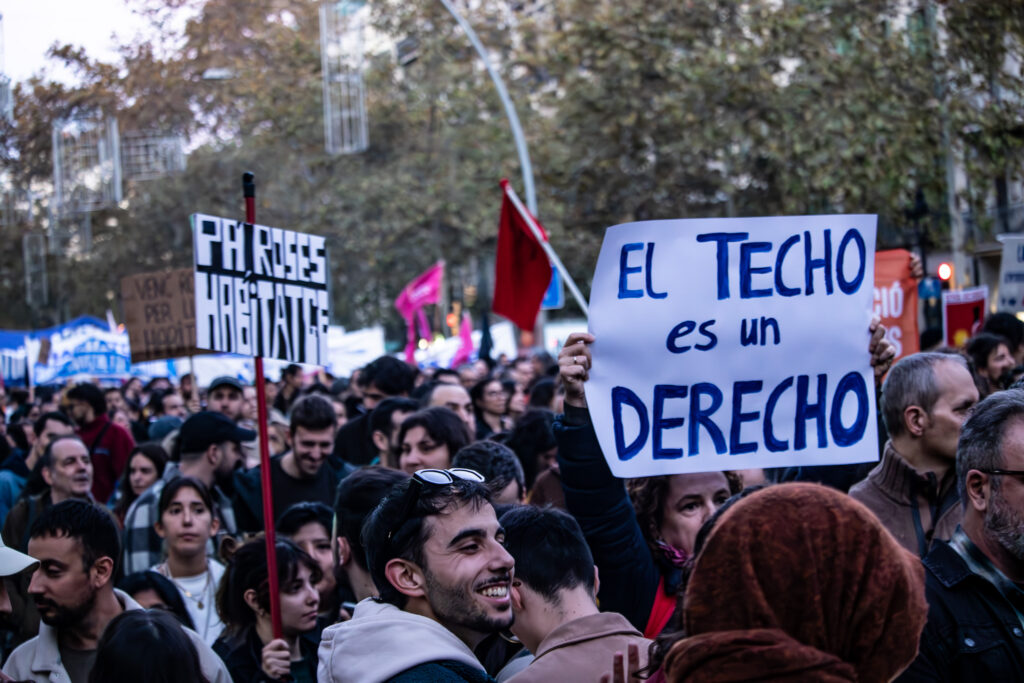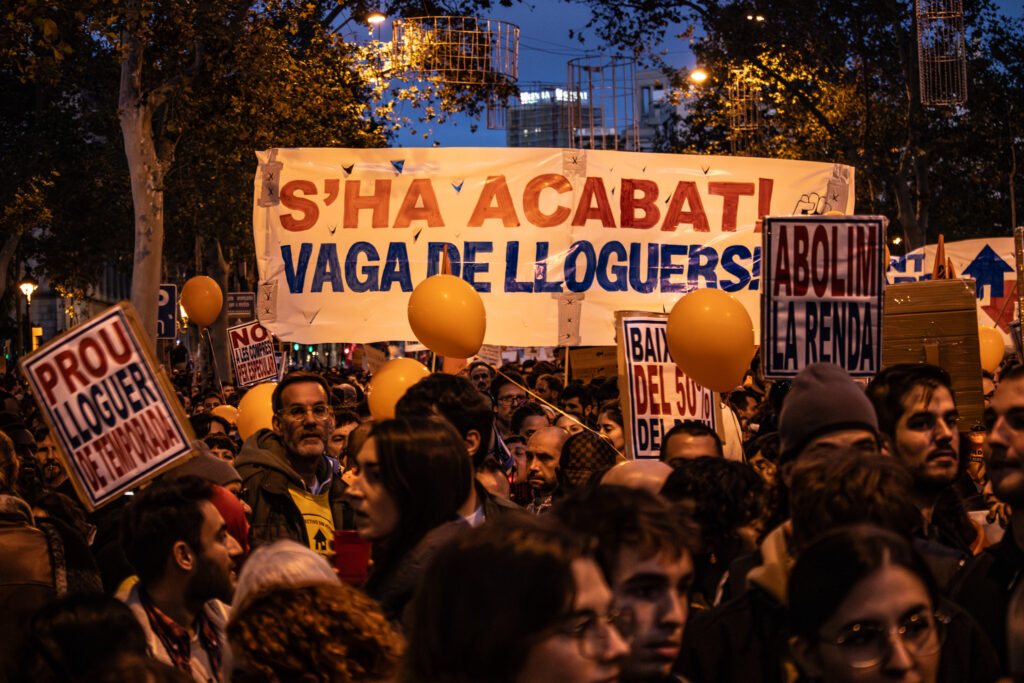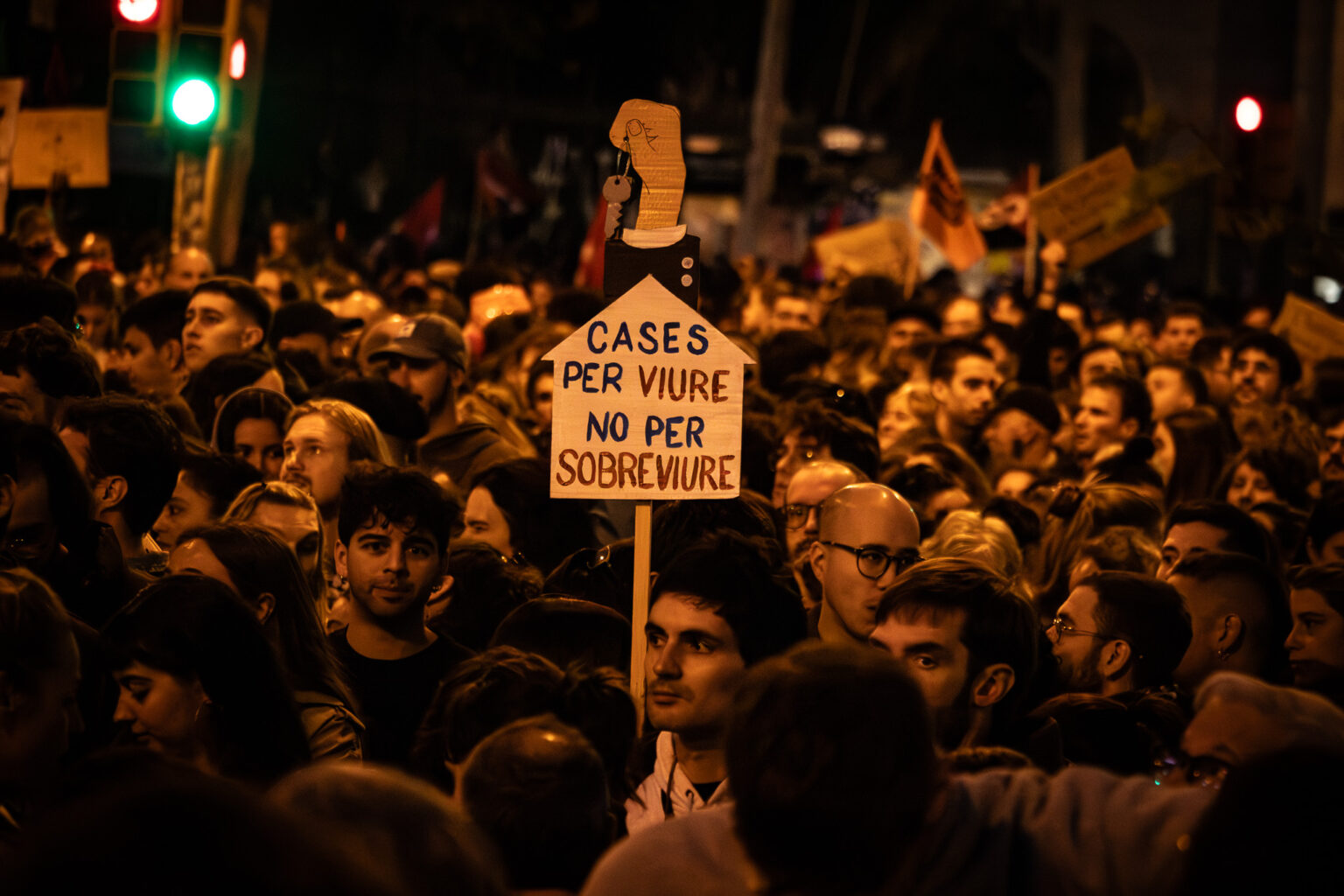Historic demonstration for the right to housing in Barcelona. ‘It’s not just the rent: they are kicking us out of our cities’.
Barcelona was once again the scene of a massive demonstration that took to the streets of the city centre to demand something as basic as decent housing. Organised by the Sindicato de Inquilinas (Tenants’ Union), the protest brought together 22,000 people, according to the Guardia Urbana, and 170,000 according to the organisation, to protest against property speculation and exorbitant rents, problems that, far from being resolved, are getting worse every year.
The march began in Plaza Universidad, where from the start there was an atmosphere of accumulated indignation and weariness, but also of collective strength. With slogans like “Enough is enough! Let’s lower the rents” or “Housing is a right, not a privilege”, the crowd moved through the main streets of the city, stopping in front of Casa Orsola, a building that has become a symbol of the resistance of the neighbourhood against the vulture funds. The march, supported by more than 4,000 organisations, reflected the transversal nature of a problem that affects all social classes. From trade unions such as CCOO and UGT to neighbourhood, feminist and cultural associations such as Òmnium Cultural, the protest showed how the housing conflict is closely linked to other struggles for basic rights.

These demands in Barcelona are part of a nationwide movement that has been gaining strength in recent months. Just a few weeks ago, on 13 October, Madrid saw one of the largest housing demonstrations in recent years. At the same time, on 20 April, a demonstration took place in the Canary Islands under the slogan ‘Canarias tiene un límite’ (The Canary Islands have a limit), highlighting the link between the housing crisis and tourist overcrowding. These mobilisations all over Spain reflect a growing unease about a structural problem that, as in Catalonia, mainly affects young people and those on the lowest incomes, making housing a central focus of the social struggle.
Among the main demands is the urgent need to reduce rents, as many families are currently forced to spend more than half of their income on rent. They also demand the introduction of permanent tenancies to guarantee housing stability and the conversion of empty flats and tourist apartments into affordable housing for citizens.
These demands have a solid basis in the data. According to the latest barometer from the Centre for Opinion Studies (CEO, according to its Spanish acronym), 44.3% of young Catalans consider access to housing to be their main problem. This figure is evidence of a structural crisis that particularly affects the younger generations, who are often condemned to live in shared flats or depend on their families for lack of alternatives. But the message of the demonstration went beyond figures and data. It’s not just that the prices are exorbitant, it’s that they are throwing us out of our cities, out of our lives,” denounced one of the speakers, while the participants chanted “No houses without people, no people without a house!”

Among the demonstrators were people with stories that reflected the urgency of these demands. “I’m forty-five years old and I’ve lived in the Sant Andreu neighbourhood all my life. Where am I going to go?” asked Marta, a neighbour affected by a process of gentrification.
In the same vein, Carlos, a 27-year-old young man who shares an apartment with three friends in precarious conditions, added: ‘I’ve wanted to be truly emancipated for years, but I can’t pay the rent alone. We live in a city that sells us success but doesn’t let us live in dignity’.
For Núria, a mother of two who works in the hotel and catering sector, the situation is untenable: ‘I earn 1,200 euros a month and pay 900 euros in rent. How can I feed my children? We are not asking for luxury; we are asking for justice”

There were also young people who came out of solidarity, like Júlia, a history student who was attending her first housing protest: ‘My generation knows that we’ll never be able to buy a house, but they won’t even let us rent one without mortgaging our lives. This has to change.”
Beyond the numbers and the headlines, it was clear that the struggle for decent housing will not stop. Because, as the banners on the march repeated, ‘Housing is not a luxury: it is a right’. And unlike those who see housing as an investment, more and more people see it as incompatible with what it should be: the fundamental pillar on which to build – and inhabit – one’s own life.


